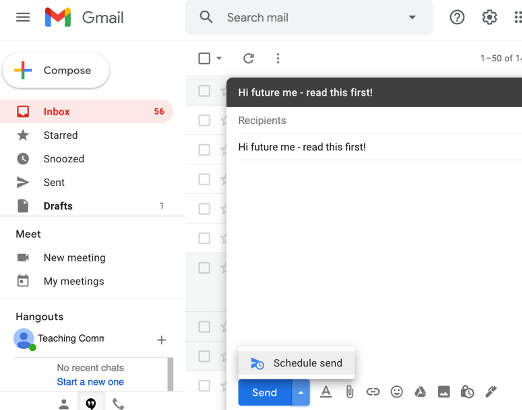Day 2: Wendy Parke's Critique Your Past Self

| Name: Wendy Parkes Area/Discipline: Bora Laskin Faculty of Law Wendy is a lawyer with a background in civil litigation. Her academic areas of interest include legal research and writing, environmental law, and Indigenous pedagogy. |
The Technique
I want my learners to think about how they have been writing in the past, refine how they are writing now, and plan achievable goals for how they want to write in future. To accomplish this, I’ve incorporated a reflective journal that learners work on throughout the course. The journal has them consider the following:
- Past Self: Strengths/weakness
- Future Self: Goals/what's left on the table
How I Use It
In my course, learners submit a reflective journal early in the term and at the conclusion. I read, edit, and comment on their submissions. Though the journal is used through the whole course, mid-course and end-of-course are my times to provide feedback and direction.
A few key elements in the assignment worth noting are the following:
- It is all right to write in the first person (this is not common in law, but it encourages learners to be more candid in their critiques and struggles).
- Learners can provide artifacts that support the comments that they share (e.g. Learner A found a paper from their second year of university -- one they always remembered fondly, saying, “That was my best writing!” Upon re-reading the paper, well, let’s just say they’ve come a long way). When I go to review learner A’s commentary about their artifacts, I’m able to diagnose areas of strength and areas where learners can develop further.
- Once learners receive feedback and for the second part of the course, learners apply what they’ve learned to course assignments that will, in turn, become their new set of artifacts.
- As a final course activity, learners are asked to submit one final entry: "Identify ‘what’s left on the table.’"
Feedback from Learners
- Some learners have commented that being given a chance to look back at past writing and considering it in relation to where they are now has been eye-opening.
- Very few learners have decided not to include artifacts. This may come up with mature students and did not impact the outcome from the experience.
A Short Task to Challenge You
Write a letter to your future self. Reflective journaling is about identifying where you were previously and bringing the best of that with you to your future activity.
- For just a minute, think of the last term that you taught online. If you need two minutes, that's ok. Are there a couple of ways that you taught during that term that you enjoyed or that you feel worked much better than you intended?
- Travel back to your D2L course space. Can you find things in your online space that help you answer this question or support answers you’ve already come up with?
- Use your writing talents to draft a letter to your future self. Share with yourself the ways you already know your course will work well and the ways you and your students are going to enjoy working together.
- Open up your Gmail account, and create a new email message. Add a title, and post your letter in the description. Next, add yourself as the Recipient. Don't send it just yet.
- How to send what you’ve learned to your future self: Schedule your letter to send on January 1, 2021, by choosing the ‘More’ arrow, next to the ‘Send’ button. ;-)

One Final Task
Is this something you can use in your classroom? How might you utilize it? If you want to share your results on social media, please let us know by using the hashtag #12techLUDay2.

